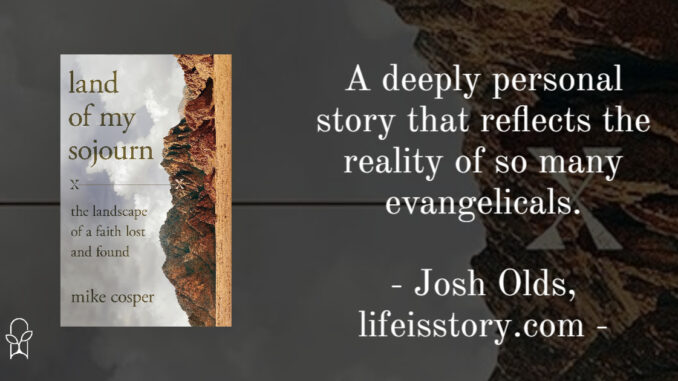
Also by this author: Land of My Sojourn: The Landscape of a Faith Lost and Found
Published by IVP on February 27, 2024
Genres: Non-Fiction, Memoir
Buy on Amazon
Goodreads

In the years since leaving local church ministry, I've devoted an enormous amount of time and resources to examining the church's often troubled witness, its ongoing crisis of leadership, and the epidemic of narcissism, abuse, and cover-up that has continued to emerge year after year. This book is about my journey both before and undergirding that work―the shattering of dreams and the grace that restored a broken faith in the aftermath. It's a story about grace leading me home when I thought all was lost.
Taken together, my encounters with Peter, Elijah, and Jesus connected to indelible images from my time in Israel and formed a new spiritual landscape in my mind, one with enough gravity to draw my feet back to solid ground. My hope is that as I tell this story you might find echoes of your own. I pray if you're in the wilderness, you might find that though the territory is a mystery, you are far from alone. Most of all, I pray that you rediscover that Jesus is chasing you like a lover . . . right through heaven's gates.
Mike Cosper first came to my attention a while back when he hosted the podcast The Rise and Fall of Mars Hill, a podcast documentary chronicling what the title suggests, offering specific condemnations of founding pastor Mark Driscoll’s emotional and spiritual abuses, toxic masculinity, and lust for power. It also offered a more general critique of the megachurch model of church—consumeristic, hierarchical, and power-focused. I didn’t know until this book—Land of My Sojourn—that Cosper had been the victim of a less-bombastic and more-typical church hurt that led to him leaving formal ministry in 2015. Reeling from this change in his vocational life, Cosper was also confronted with a change in evangelicalism as White evangelicals coalesced around Donald Trump in the 2016 US Presidential election. It was an unmooring experience and the build-up and aftershocks of that trauma is the subject of this reflective memoir.
Cosper’s story isn’t unique. A large number of evangelical clergy found themselves struggling to navigate the choppy pastoral waters as Republican politics—always prominent in White evangelicalism—suddenly had to grapple with a moral nightmare in Donald Trump. In this way, Land of My Sojourn reflects the reality of many evangelicals, both clergy and laity, who have struggled to find their place or even keep the faith in light of the past decade or so of changes. Cosper writes with clarity, precision, and emotion, drawing the reader into the story.
In speaking of the problems within his megachurch structure, he wrote that it always felt like they were one good conversation away from fixing everything. That, to me, was the most enlightening part of the book. You’ve created this thing. It started out good. You had idealism and passion and now it’s become something else and you want to recreate it to be that thing that it was and you keep fighting and fighting and believing that surely this one more change and one more conversation with right the wrongs and that’s how you end up in an unrecognizable place where the only solution is filled with pain and trauma. I felt every bit of that.
I do wish that Cosper had spoken more about how leaving vocational ministry affected him spiritually. He still attends a church location that was associated with the church that fired him and hurt him. How did he work through that? Has his faith changed? Has his ecclesiology changed? Land of My Sojourn doesn’t really get much into that, just simply saying that Cosper is choosing to remain because Jesus is bigger than his misguided followers. I also wanted to know what hope Cosper saw for the future—both within Christianity generally and evangelicalism in particular.
Land of My Sojourn is a deeply personal story that reflects the reality of so many evangelicals just struggled to hold on. Cosper offers hope, solidarity, and comfort as he uses his story to encourage others to persevere. While I wish Cosper had gone deeper in a few areas or talked more specifically about some important ways in which he may or may not have changed, I still deeply appreciate his ability to share his story.
